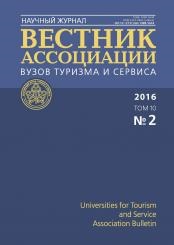Article is devoted to a problem of social planning in the student’s environment, as a mechanism which acts as the volunteering. The article describes the implementation experiences of social and pedagogical university students of volunteer project aimed at increasing the level of professional competence of future bachelors of pedagogical education in the field of fine arts, on the one hand, and on the other at the inclusion of children from socially disadvantaged groups to contemporary art through the practice of the fine arts and decorative-applied creativ- ity. Corresponding to current educational standards of higher school, the practical preparation of future teachers cannot fully realize the students need for testing their professional skills. One of the possible ways of solving this problem was the creation of the design studio as a socially significant project by volunteer-students. Unlike secondary schools, the work of the studio is not governed by the educational standards, a educational program and strict requirements for development. Consequently, this form allows taking into account the interests of children and the needs of students in obtaining practical experience with the students. The study reveals that the collabora- tive process of future teachers and students has a rather complex structure and includes the following components: cognitive, emotional-valuable, active, reflexive evaluation. Achievement of target indicators of the project and its successful implementation allows continuing the process of social planning in the field of art education, aimed at children with speech development violations’ acquaintance with the work of artists of their native land and create their own copies of the paintings, followed by applying them to the tissue. A.S. Makarenko emphasized that «we need to teach children the desire to achieve some goals, but don’t just teach them» that in the context of our project is implemented through the creation of textiles, panels, accessories in the classroom by children, developing their creativity and encouraging them in a conscious, purposeful and creative activity.
volunteering, professional practical training of teachers, social planning
1. Voloshhenko I.I., Professional’naja praktika kak sredstvo socializacii lichnosti budushhego uchitelja: Avtoref. dis.. kand. sociol. nauk (Professional practice as a means of socialization of future teachers: Candidate of Sociology’s thesis). Rostov-on-Don, 2005. (In Russ).
2. Zagladina H., Volunteering and the implementation of social potential of children and youth in the context of Russian educational policy. Obshhestvennaja politika, 2014, no. 4 (66), pp. 57-73. (In Russ).
3. Zajceva I.A., Volunteering as student’s socially significant activity. Problemy postsovetskogo prostranstva, 2016, no. 2 (8), pp. 69-82. (In Russ).
4. Ivanova N.N., Volunteer activities of students in the social project for children with special educational needs. Social peda- gogy: integration of theory and practice. Proceedings of Russian scientific-practical conference of the Department of social pedagogy «North- Eastern Federal University in Yakutsk», 2016, pp. 81-83. (In Russ).
5. Kagarmanova G.G., The problem of teaching activities modeling. Put’ nauki, 2014, no. 6, pp. 100-102. (In Russ).
6. Krjukova T.A., Malahova V.G., Organization of pedagogical practice of students of the University in modern conditions. Alma Mater (Vestnik vysshej shkoly), 2015, no. 2, pp. 80-84. (In Russ).
7. L’vova S.V., Development of volunteerism in the education system. Nauka 21 veka: voprosy, gipotezy, otvety, 2016, no. 1(6), pp. 40-44. (In Russ).
8. Markelova S.A., Setevaya distantsionnaya podderzhka pedagogicheskoi praktiki studentov: Avtoref. dis.. kand. ped. nauk (Net- work distant support of students’ pedagogical practice: Candidate of Pedagogic’ thesis), St. Petersburg, 2010. (In Russ).
9. Petoshina S.I., Ryzhkova I.V., Tegaleva T.D., Pedagogical volunteering in educational institutions as a factor of student’s social and professional competence development. Sovremennye problemy nauki i obrazovaniya, 2015, no. 6-0, p. 431. (In Russ).
10. Salivon E.G., Pedagogicheskaya praktika budushchikh uchitelei kak faktor ikh lichnostno-professional’nogo stanovleniya: Avtoref. dis…kand. ped. nauk (Pedagogical practice of future teachers as a factor of their personal and professional devel- opment: Candidate of Pedagogic’ thesis), Komsomolsk-on-Amur, 2005. (In Russ).
11. Stenina T.L., Formation of Design Culture of Students in the Context of Sociocultural Approach to Modernization. Izvestiya Saratovskogo universiteta. Novaya seriya. Akmeologiya obrazovaniya. Psikhologiya razvitiya, 2013, vol. 2, no. 1, pp. 75-80. (In Russ).
12. Shirobokov V.N., The development of motivation of youth as a stage of volunteer activities. Mezhdunarodnyi zhurnal eksperimental’nogo obrazovaniya, 2014, no. 1-2, pp. 102-104. (In Russ).
13. Carina Girvan, Claire Conneely, Brendan Tangney. Extending experiential learning in teacher professional development. Teaching and Teacher Education, August 2016, vol. 58, pp. 129-139.
14. Maiskiy G. Scintific consepts in the organization of pedagogical practice. Problemy inzhenerno-pedagogichnoï osvity, 2012, no. 37, pp. 8-12.
15. Rong-Ji Chen., Investigating models for preservice teachers’ use of technology to support student-centered learning. Com- puters & Education, August 2010, vol. 55, no. 1, pp. 32-42.
16. Rosario Gil-Galván, F. Javier Gil-Galván, How to Use Professional and Life Projects to Guide University Students To- wards Optimal Professional Development. Procedia - Social and Behavioral Sciences, October 2013, vol. 93, no. 21, pp. 1901-1905.





